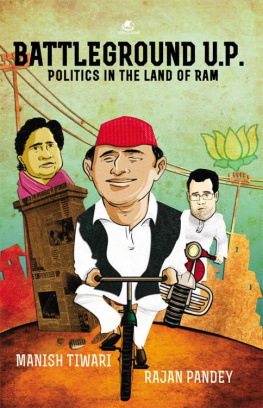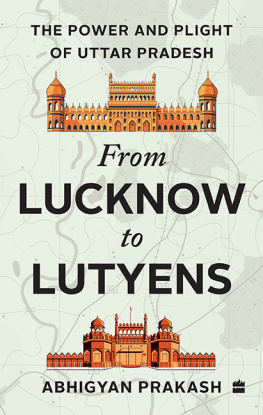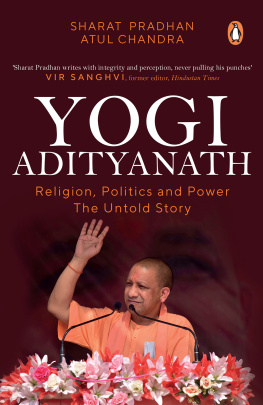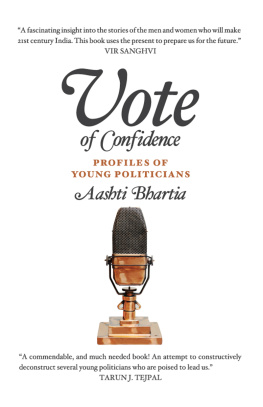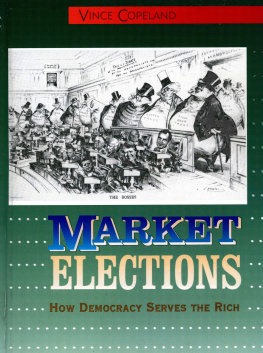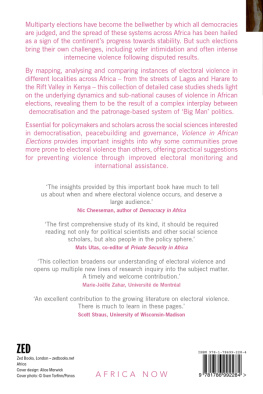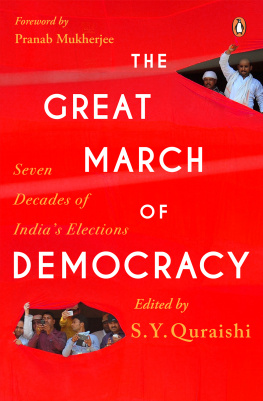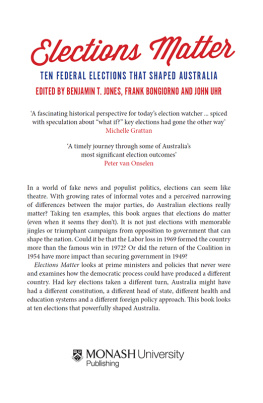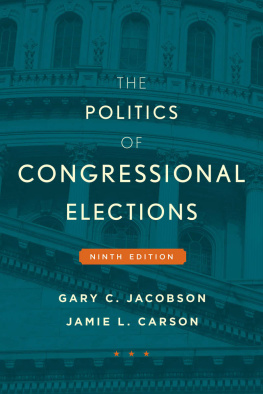TRANQUEBAR PRESS
BATTLEGROUND U.P.: POLITICS IN THE LAND OF RAM
Manish Tiwari: Manish has been associated with the electronic and print media for almost fifteen years in different places, capacities and institutions - from newspapers in small towns (1996 in Ajmer) to top brands in the electronic media (Research Head for Devil's Advocate with Karan Thapar, 2011). Manish has intermittently taught sociology, journalism and media & cultural studies at different colleges and universities since 2006. He has also been DFG-Post Doctoral Guest Lecturer in Political Communication at the Siegen University, Germany, in 2010. Manish has done his schooling, graduation and post-graduation from Ajmer, where he grew up, and M.Phil and Ph.D from Jawaharlal Nehru University, New Delhi. Manish has co-edited a book on participatory democracy with Prof Anand Kumar in 2009 and another on social aspects of water-management will be published later in 2013. Manish now works independently in fields of communications and social research and lives in New Delhi with his wife and daughter.
*
Rajan Pandey: Born in Maharashtra, brought up in his hometown in Mainpuri (UP), educated in Rajasthan and Delhi, and married to his classmate from Assam, Rajan is a Ph.D candidate at the Centre for Political Studies, JNU. Rajan has a diverse range of interests, from literature to strategic affairs, travelling, cooking and but of course, eating. A voracious reader, he goes through crime fiction and serious academic stuff with equal gusto. He is currently in Goettingen, Germany on a Doctoral Visiting Fellowship at the Centre for Modern Indian Studies. Associated with student politics for seven years, Rajan intends to take up politics after finishing his Ph.D. Alongside a political career, he wants to start a farmers' cooperative in his home state on the lines of AMUL, which could bring similar prosperity and opportunities to rural Uttar Pradesh.
TRANQUEBAR PRESS
An imprint of westland ltd
61, Silverline Building, Alapakkam Main Road, Maduravoyal, Chennai 600 095
No. 38/10 (New No.5), Raghava Nagar, New Timber Yard Layout, Bangalore 560 026
93, 1st Floor, Sham Lal Road, Daryaganj, New Delhi 110 002
First published in TRANQUEBAR PRESS by westland ltd, 2013
First e-book edition: 2013
Copyright Manish Tiwari and Rajan Pandey 2013
All rights reserved
ISBN: 978-93-83260-10-2
Typeset in Adobe Garamond by SRYA, New Delhi
DISCLAIMER
Due care and diligence has been taken while editing and printing the book. Neither the Author, Publisher nor the Printer of the book hold any responsibility for any mistake that may have crept in inadvertently. Westland Ltd, the Publisher, and the printers will be free from any liability for damage and losses of any nature arising from or related to the content. All disputes are subject to the jurisdiction of competent courts in Chennai.
This book is sold subject to the condition that it shall not by way of trade or otherwise, be lent, resold, hired out, circulated, and no reproduction in any form, in whole or in part (except for brief quotations in critical articles or reviews) may be made without written permission of the publishers.
Contents
Acknowledgements
WRITING THE ACKNOWLEDGEMENTS IS DEFINITELY A TOUGHER JOB than writing the book. The fear of missing out important names not just fills you with the guilt of being thankless, it is also very dangerous professionally as you turn admirers and friends into critics of the book who decide to tear it down the moment they finish reading the foreword. In a scenario like this, beginners like us are so terrified that they virtually write down each and every name they know, thus making the foreword look like a contact list, only without the numbers.
The other approach to writing it is to miss most of the names, and club them in broader categories like 'friends', 'family', 'teachers', 'experts', etc. Anyone complaining about the lack of acknowledgement could be cajoled by saying that since s/he was 'family' or 'friend' or the 'teacher', due acknowledgment of her/ his contribution has been made already. Since this is a safer approach, we would like to resort to this.
The first credit for this book goes to the people of the Land of Rama, Uttar Pradesh, who shared their views, opinions, aspirations and complaints with us without expecting anything in return. We have only tried to give voice to their concerns through this book, so that it could possibly reach the politicians and the policymakers who have lost touch with ground realities and folk-wisdom.
Numerous journalists, mostly rural and town based, shared their insights with us in the course of writing this book. The accuracy of their information sometimes left us surprised. We believe that these numerous less-talked of soldiers of the 'fourth estate' possess an incomparable pool of information and knowledge, which could be of great significance in successful implementation and monitoring of governance and democratic functions.
We greatly appreciate the patience of our family members who peacefully endured our crazy pursuits when we decided to write the book and then spent month after month working on it, amidst the requirements of our respective professional careers. The lack of hostility shown by them in this regard would definitely qualify as 'support' and 'encouragement' and we sincerely thank them for not raising hell when we were working on it. Dear family members, here is the return for all your patience. You can now boast of being related to 'writers' and brag about intellectual stuff among your social circles.
We are extremely thankful to our teachers and to the ethos of JNU, which gave us an approach to understand the world and widened our perspective in dealing with it.
We also extend thanks to Writer's Side and its leader Kanishka Gupta for successful perusal of our case with the publishers. We extend our sincere thanks to the Westland-Tranquebar team for publishing the book.
We can't be grateful enough to those numerous, unmentioned people who helped us in innumerable ways during our journeys in the state of UP.
In the end, as is the custom, we accept that all shortcomings of the book are ours, and no one else needs to be blamed for the same.
| New Delhi | MANISH TIWARI |
| March 2013 | RAJAN PANDEY |
PROLOGUE
THIS BOOK IS THE RESULT OF THREE EVENTFUL JOURNEYS THAT WE made across the state of Uttar Pradesh (UP) between 27 March 2011 and 3 March 2012. The first one was a bike ride from Delhi to Gorakhpur passing through a number of other places. The second was a train journey from Delhi to Lucknow and, finally, a non-stop two-month bike tour across the state. The first two trips occurred in 2011. In 2012, with the intention of focusing exclusively on the elections, we went from Delhi to Lucknow by train on 29 January. From there we went to Bahraich by bus, where we borrowed a motor-bike from a local contact to start the final phase of this exercise, which ended with the last round of voting on 3 March. In all, we travelled nearly 15,000 kilometres on the bike in one year, covering more than 350 constituencies in over sixty districts of Uttar Pradesh, including Mainpuri, Rajan's home district.
These journeys helped us understand a lot of things that we were unaware of. People gave us an insight into their conditions, thought processes, questions and concerns. These trips also helped us grasp regional differencessocial, cultural, political and ecologicalalong with the historical legacies of the state. In the course of this exercise, we also changeda little for the better, we would like to believe.
Next page
